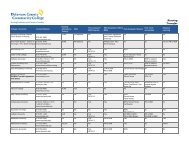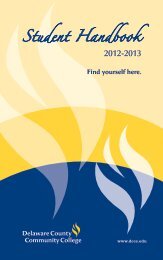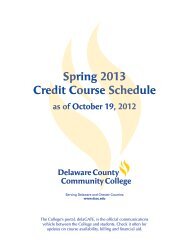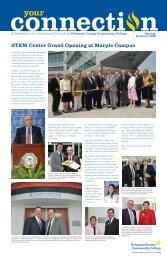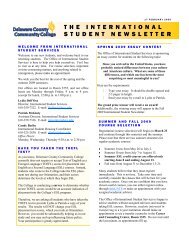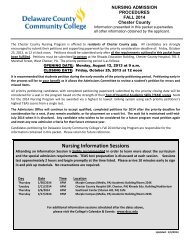2010 Catalog - Delaware County Community College
2010 Catalog - Delaware County Community College
2010 Catalog - Delaware County Community College
Create successful ePaper yourself
Turn your PDF publications into a flip-book with our unique Google optimized e-Paper software.
144 COURSE DESCRIPTIONS<br />
Upon successful completion of this course, students<br />
should be able to:<br />
• Assess the pathophysiological and psychosocial<br />
influences affecting the patient's response to<br />
surgical intervention.<br />
• Demonstrate the knowledge and skills needed to<br />
implement the perioperative role.<br />
• Apply principles of asepsis in providing patient care<br />
during the intraoperative period.<br />
• Function as a member of the interdisciplinary team in<br />
providing patient care during the intraoperative period.<br />
• Demonstrate application of the nursing process in<br />
providing nursing care to the patient receiving<br />
surgical intervention.<br />
Prereq. NUS 205<br />
3 Credits 6 Weekly Clinical Hours<br />
NUS 207<br />
RN First Assistant<br />
The knowledge and technique necessary to assuming<br />
responsibilities of the RN First Assistant are emphasized.<br />
The role diversity of the first assistant is explored in its<br />
interdependent relationship, as the nurse works both with<br />
the physician and for the benefit of the patient. The nursing<br />
diagnosis is used as the defining guide in planning and<br />
implementing patient care. Expanded functions are stressed<br />
and elaborated as the nurse is prepared to assume<br />
responsibility in scrubbing, draping, retracting, exposing,<br />
clamping, ligating and suturing. Intellectual and manual<br />
dexterity are combined to prepare the nurse with the<br />
essential skills necessary to this expanded professional<br />
role. The <strong>College</strong> recognizes AORN's position statement on<br />
the role of the RN First Assistant. The program meets AORN<br />
Education Standards and is accepted by the Competency<br />
and Credentialing Institute for Perioperative Nursing.<br />
Upon successful completion of this course, students<br />
should be able to:<br />
• Trace the historical role of the nurse in the<br />
operating room.<br />
• Apply principles of asepsis, infection control, physical<br />
assessment and the nursing process.<br />
• Review surgical anatomy, physiology and operative<br />
techniques related to first assisting.<br />
• Recognize surgical hazards and initiate appropriate<br />
corrective and preventive action.<br />
• Validate intraoperative nursing behaviors of handling<br />
tissue, providing exposure, using surgical instruments,<br />
suturing and providing hemostasis.<br />
Prerequisite: 2 yrs Perioperative Experience<br />
3 Credits 3 Weekly Lecture Hours<br />
NUS 208<br />
RN First Assistant Internship<br />
The RN First-Assistant Directed Internship offers clinical<br />
preparation for perioperative nurses in first assisting. This<br />
internship is based on certain assumptions about the<br />
rights of patients and needs of the learner. The <strong>College</strong><br />
attaches significance to the patient's right to have a<br />
qualified assistant during surgical intervention. The<br />
perioperative nurse who is prepared as a first assistant is<br />
capable of acting collaboratively in assisting both surgeon<br />
and patient. The <strong>College</strong> also believes that the perioperative<br />
nurse entering this internship will be a highly<br />
motivated individual and bring to the internship personal<br />
and professional experience of high quality. Flexibility and<br />
respect for individual student goals are essential in<br />
planning the internship. Therefore, each student has an<br />
active part in determining objectives, identifying learning<br />
resources and evaluating attainment of goals. Students<br />
work with a <strong>College</strong> faculty facilitator and surgical preceptor<br />
during the internship. The <strong>College</strong> recognizes AORN's<br />
position statement on the role of the RN First Assistant.<br />
The program meets AORN Education Standards and is<br />
accepted by the Certification Board for Perioperative Nursing.<br />
Upon successful completion of this course, students<br />
should be able to:<br />
• Demonstrate application of principles of asepsis<br />
and infection control, physical assessment and<br />
nursing process.<br />
• Recognize surgical anatomy and physiology and<br />
operative technique related to first assisting.<br />
• Demonstrate skill in recognizing surgical hazards and<br />
initiate appropriate corrective and preventive action.<br />
• Carry out intraoperative nursing behaviors of handling<br />
tissue, providing exposure, using surgical instruments,<br />
suturing and providing hemostasis.<br />
The following must be submitted prior to registering for<br />
the Internship:<br />
• A letter from the department manager validating the<br />
nurse's experience (in years), proficiency in scrub and<br />
circulator roles, ability to perform in stressful and<br />
emergency situations, and ability to perform effectively<br />
and harmoniously as a team member.<br />
• A copy of the display portion of the professional license<br />
to practice nursing in the state in which the internship<br />
is to be done.<br />
• Evidence of current professional malpractice insurance<br />
(policy and cancelled check)<br />
• Completed health examination (form supplied by the<br />
<strong>College</strong>)<br />
• Evidence of current health insurance policy.<br />
• Evidence of current CPR certification (ACLS)<br />
• Copy of certification card (CNOR)<br />
Prereq. NUS 207<br />
3 Credits 3 Weekly Lecture Hours<br />
6 Weekly Clinical Hours<br />
NUS 210 Nursing Concepts and<br />
Practice II<br />
NUS 210 builds on the knowledge and skills gained<br />
in previous college courses and in NUS 110 and 111<br />
specifically. The nursing processes of assessment, diagnosis,<br />
planning, implementation and evaluation are<br />
identified and explained for a selection of patients across<br />
the lifespan who have complex psychological and physiological<br />
need interferences. In concurrent clinical practice,<br />
students will demonstrate knowledge and skills,<br />
integrating pharmacology, nutrition, communication<br />
principles, and utilizing advanced technologies.<br />
Upon successful completion of this course, students<br />
should be able to:<br />
• Use the nursing process in the care of patients with<br />
complex need interferences with safety and security.<br />
• Use the nursing process in the care of patients<br />
with complex need interferences in fluid and<br />
electrolyte balance.<br />
• Use the nursing process in the care of patients with<br />
complex need interferences in oxygenation.<br />
• Use the nursing process in the care of patients<br />
with complex need interferences in the utilization<br />
of nutrients.<br />
• Use the nursing process in the care of patients with<br />
complex need interferences in regulatory function.<br />
• Demonstrate critical thinking skills when caring for<br />
patients with complex health problems utilizing<br />
advanced technologies in a variety of structured health<br />
care settings.<br />
Prereq. NUS 111, BIO 151<br />
10 Credits 4 Weekly Lecture Hours<br />
12 Weekly Laboratory Hours<br />
NUS 211 Nursing Concepts and<br />
Practice III<br />
NUS 211 provides the student with the opportunity to<br />
integrate previously acquired knowledge with new concepts<br />
and technologies relating to patients with complex multisystem<br />
needs. Ethical and legal aspects, and principles of<br />
management are explored. The use of case studies provides<br />
the student the opportunity to explore nursing management<br />
of selected patient situations. Application of theory is<br />
in acute, long-term care and community settings. The student<br />
will gain an appreciation for the scope of nursing practice<br />
by integrating the roles of provider and manager of care.<br />
Upon successful completion of this course, students<br />
should be able to:<br />
• Use leadership skills to manage nursing care for a<br />
group of patients.<br />
• Analyze pertinent ethical and legal issues in the practice<br />
of nursing.<br />
• Integrate previously learned knowledge when providing<br />
care to the older adult.<br />
• Integrate previously learned knowledge when providing<br />
care to patients with complex need interferences in<br />
oxygenation.<br />
• Integrate previously learned knowledge when providing<br />
care to patients with complex need interferences in<br />
sensory-motor functions.<br />
• Evaluate the outcome of the nursing process when<br />
caring for patients with complex multi-system needs<br />
utilizing advanced technologies.<br />
Prereq. NUS 210 Coreq. PSY 220<br />
10 Credits 3 Weekly Lecture Hours<br />
14 Weekly Laboratory Hours<br />
NUS 218<br />
LPN Concepts<br />
This course is intended to facilitate the transition of the<br />
Licensed Practical Nurse to the Associate Degree Nursing<br />
Program and then to the role of the Registered Nurse.<br />
The curriculum from the first year of the nursing program<br />
will be reviewed.<br />
Upon successful completion of this course, the student<br />
should be able to:<br />
• Evaluate the philosophy and outcome competencies of<br />
the college and the nursing program.<br />
• Compare LPN education to the first year of the program.<br />
• Utilize the college resources: Learning Center, Library,<br />
Career and Counseling Center, especially services and<br />
information related to nursing education.<br />
• Complete a Personal Education Plan that describes the<br />
transition from LPN to RN.<br />
• Interpret the Nursing 110 and Nursing 111 syllabus,<br />
modules and clinical packets and the student<br />
requirements.<br />
• Develop critical thinking and test taking skills related to<br />
multiple choice questions.<br />
• Demonstrate proficiency in selected nursing skills.<br />
• Interpret the transcultural influences on nursing care.<br />
• Compare and contrast the different roles of the LPN and<br />
the RN.<br />
Prereq. NUS 210, ENG 100, PSY 140, NUS 102<br />
3 Credits 3 Weekly Lecture Hours<br />
NUS 220<br />
Clinical Enhancement Skills<br />
This course is structured to provide the student and other<br />
health care provider with the enhanced clinical skills,<br />
knowledge, psychomotor expertise, and basic principles to<br />
perform and record electrocardiography, arrhythmia interpretation,<br />
and phlebotomy. The identification of normal and<br />
abnormal EKGs including the review of the anatomy and<br />
physiology of the electrical conduction system of the heart<br />
will be covered. Legal issues will be discussed along with<br />
appropriate documentation, IV medications and alternative<br />
IV infusions systems. By the end of the course, the student<br />
will have the ability to integrate theory and practice to<br />
safely and with confidence identify normal and abnormal<br />
cardiac rhythms, successfully perform phlebotomy,<br />
maintain, and trouble shoot IV infusions, and perform and<br />
record electrocardiographs.<br />
DELAWARE COUNTY COMMUNITY COLLEGE




